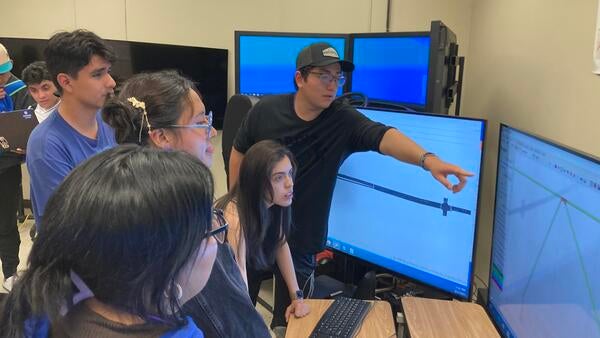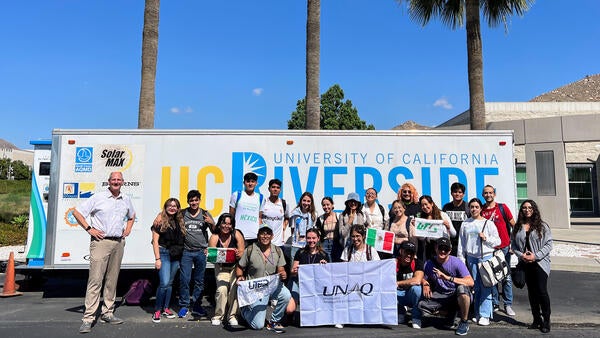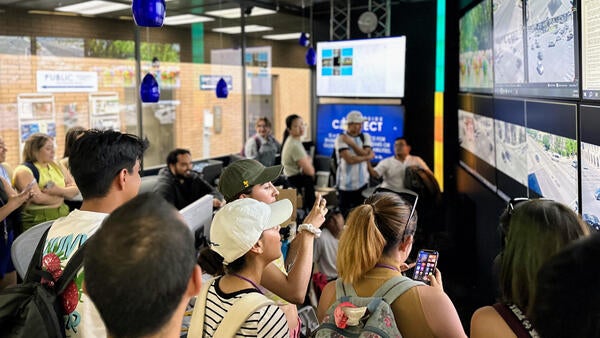
Ximena Nieves’s journey to learn how to make the world less polluted and make communities healthier brought her nearly 3,000 miles away from home.
In labs, workshops, and classes, the engineering student from central Mexico learned about technology that reduces vehicle emissions and traffic-management systems that track cars and people in real-time. It was all part of a new UC Riverside certificate program designed to benefit her educational and professional goals.
“This certificate is going to benefit me in many ways, like help [create] more opportunities in my future, have more opportunities for jobs, and [help] me learn more about the planet and sustainability,” Nieves said.
Nieves was one of about two dozen engineering undergraduate students from the Mexican states of Querétaro and Michoacán who enrolled in the Specialized Study Entrepreneurial Certificate in Sustainable Transportation and Community Solutions program this past summer. The program was developed as a collaboration between the Marlan and Rosemary Bourns College of Engineering’s Center for Environmental Research and Technology (CE-CERT), UCR University Extension, and the Office of Technology Partnerships (OTP).

The program was designed to provide students the opportunity to learn more about the latest advancements, challenges, and opportunities in reducing the environmental and social impacts of transporting people and goods. It covered automated vehicles, renewable energy, reducing emissions, and other topics. Students also took courses in entrepreneurship geared to help them launch start-ups that could tackle environmental issues as well as English-language classes to help them polish their presentation skills.
Students came from five Mexican universities — Universidad Tecnologica de Querétaro, Universidad Tecnologica de San Juan Del Rio, Universidad Tecnologica de Morelia, Universidad Aeronautica en Querétaro, and Universidad Tecnologica de Corregidora. Alianza MX, an initiative that represents the UC system’s role as Mexico’s primary institutional research and scientific partner, connected UCR University Extension to the Querétaro state government. The State of Querétaro Ambassador Scholarship program selected the students and funded the cost of the certificate program.
Students attended classes and lectures and participated in laboratory sessions and site visits as part of the three-week program.
Some students said the program made them eager to take what they had learned and bring it back to their country.
“I liked the program that they taught us,” said Jesus Uriel Arreguia Potenciano. “…It was very interesting because here [the United States] they have very strategic methods of how transportation works and moves in the streets of California. We can show these methods and programs to other countries like mine.”

Arantza Alcalá Lazcano, an aeronautical engineering major, said the program underscored the global importance of implementing sustainable technologies and policies.
“We need to save the planet because we are already living in it, and it’s the only home we have,” she said. “If we don’t take care of it, we won’t have a nice place to live. I think we need to stop these emissions and take care of our home.”
CE-CERT provided the program’s core lecture and laboratory sessions on sustainable transportation, zero-emission vehicles, transportation engineering, and transportation policies. Solutions covered included advanced vehicle technology, reducing carbon from transportation energy sources, and travel demand management. The center is working with state California Air Resources Board (CARB) officials to help big-rig trucks meet the state’s tailpipe emissions standards by running a testing program that ensure heavy-duty trucks are properly tested.
Students also took part in site visits to CARB and Riverside’s Traffic Management Center.
“What I found interesting is they can use cameras to [detect] the emission on the buses and the cars, [and] they can watch the streets and people, and how they can help to reduce that,” Nieves said.

Through UCR University Extension and the OTP, students took “English for Entrepreneurs and Engineers” classes and entrepreneurship workshops designed to support students interested in creating new, start-up industries that could deliver intelligent transportation strategies to communities that need solutions the most.
“This professional certificate program is an excellent example of bringing together academic and professional resources to benefit students both in the classroom and in their careers,” said D Dayton, director of program development at UCR University Extension. “It is particularly gratifying that, in partnership with OTP and CE-CERT, we are able to create opportunities for international students and uphold the importance of sustainable transportation across the disciplines of engineering, science, and business.”
Students also said the knowledge they gained would reap professional benefits as they pursued engineering careers.
“The sustainability transportation certificate benefits me because my career is in renewable energy, and that can help me to find a good job or maybe to earn a bigger salary and [have] a better quality of life,” said Diego Valentin González Gallegos. “And it will also help my community to have sustainable transportation.”
Nieves said she thoroughly enjoyed the learning experiences and campus life.
“What I really liked about my instructors is that they inspired me to take advantage of the opportunities that appear in my future and to focus on my career,” she said.